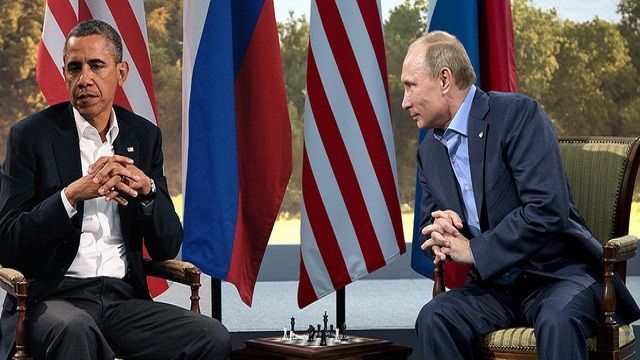The Eagle versus the Bear: what next for Russia? Photo courtesy of Flickr
By Lawrence Nzuve
Contributing Writer
Reports a week ago that Russia had started flying drones over the Syrian airspace was just an addition to a series of both overt and covert decisions that the former Soviet bloc country has taken in recent days.
According to a Reuters report, US officials said this was the first military air operation that the Russians were carrying out after a military buildup at a Syrian Airbase.
The latest Syrian incursion therefore brings to fore serious issues of international concern because the war against Islamic State of Iraq and Syria (ISIS) militants in Syria has become increasingly complicated.
Both nations acknowledge that they are fighting ISIS, albeit in different ways. The US has continuously held the notion that bringing Bashar al-Assad down will significantly move the country to new leadership and therefore provide a new impetus into the war. On the other hand, Assad has always been propped by Russia who remain a close ally both to the country and the Assad family in particular.
The US is concerned that Russia may ultimately target rebel fighters opposed to Assad’s regime because of his previous support of the Syrian president.
United States and coalition forces have been helping the rebels in the hope that they can bring down Assad and provide an easier way of fighting ISIS inside Syria, but the Russia’s entry has ultimately complicated this push.
US recently held talks with Russia on ways of ensuring that their air missions do not unnecessarily engage on air; in military parlance known as ‘deconfliction’.
Arming rebels in Syria with the ultimate goal of toppling Assad seems fraught with many problems. These problems would not just concern the US and Israel but potentially the entire Middle East. As Senator Rand Paul has opined in the past, Assad’s downfall could herald a rule by ISIS itself.
Additionally, since many of the weapons supplied by the US, Saudi Arabia and Qatar seem to have fallen in the hands of the ISIS, America finds itself up against its own superior weapons.
This is something United States would not want to confront. Indeed, there are enough examples of how despots who have terrorized their countries and eventually fallen have left behind nations consumed with civil wars. Iraq, Libya and possibly Syria come to mind.
A present concern cutting across the world is the refugee crisis. To date the conflict has claimed the lives of more than 250,000 and resulted into more than 4 million refugees according to United Nations High Commission for Refugees (UNHCR).
The European Union had to forcibly agree to host thousands of refugees threatening the unity of the countries in the union. Several countries reportedly were opposed to the move. The United States buckling under pressure of appearing to look insensitive promised to raise the uptake of refugees from 70,000 to 100,000 with the promise of absorbing more.
This is not something that the United States population is happy with, especially since vetting the refugees is not foolproof and fears abound that some of them could take advantage and access the US with the sole purpose of propagating terror activities.
To quote the words of Colin Powell, US former Secretary of State, “War should be the politics of last resort. And when we go to war, we should have a purpose that our people understand and support.”
Indeed, a country should only go to war to win. Senator Paul goes ahead to let us in on this issue from the government through the State Department. “There’s no military solution here that’s good for the Syrian people, and that the best path forward is a political solution.”


